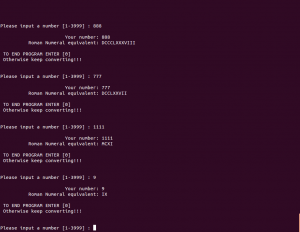Lab Description:
This lab required us to create a decimal to Roman numeral converting program in HLA. This specific program used one of the simplest methods which is utilizing only subtraction.
Code:
program decimaltoroman;
#include("stdlib.hhf")
// Yevgeniy Babkin --- CET3510
//
// this program provides a simple way to convert
// Decimal numbers to Roman numerals
static
// declare a 16-bit variable thats greater than 0.
x: int32:=999;
begin decimaltoroman;
// console.cls(); clears the original cmd window for a cleaner look.
console.cls();
// main while loop that establishes an exit strategy;
while((x != 0)&&(x != 4000)) do
stdout.put(nl,"Please input a number [1-3999] : ");
//the following commands "cin" the user input number
// and move it into the 32 bit register
stdin.get(x);
mov(x, EAX);
//next line is the main if loop that see's if the number is within 1-3999 range
//prgrm will not run right without it!!!
if(EAX<4000 && EAX>0)then
//spacing is added to the 1st stdout to center the wording for
//easier readability
stdout.put(nl " Your number: ",x, nl, " Roman Numeral equivalent: ");
//the program is fairly basic as it subtracts known roman numeral values
//to figure out which and how many roman numearals to display.
if(EAX>=1000 && EAX<4000) then
while(EAX>=1000) do
sub(1000, EAX);
stdout.put("M");
endwhile;
endif;
if(EAX>=900) then
sub(900, EAX);
stdout.put("CM");
endif;
if(EAX>=500) then
sub(500, EAX);
stdout.put("D");
endif;
if(EAX>=400) then
sub(400,EAX);
stdout.put("CD");
endif;
if(EAX>=100 && EAX<400) then
while(EAX>=100) do
sub(100, EAX);
stdout.put("C");
endwhile;
endif;
if(EAX>=90) then
sub(90, EAX);
stdout.put("XC");
endif;
if(EAX>=50) then
sub(50, EAX);
stdout.put("L");
endif;
if(EAX>=40) then
sub(40,EAX);
stdout.put("XL");
endif;
if(EAX>=10 && EAX<40) then
while(EAX>=10) do
sub(10, EAX);
stdout.put("X");
endwhile;
endif;
if(EAX>=9) then
sub(9, EAX);
stdout.put("IX");
endif;
if(EAX>=5) then
sub(5, EAX);
stdout.put("V");
endif;
if(EAX>=4) then
sub(4,EAX);
stdout.put("IV");
endif;
if(EAX>=1 && EAX<4) then
while(EAX>=1) do
sub(1, EAX);
stdout.put("I");
endwhile;
endif;
// last stdout lets user know how to exit the program
// by entering 0, even though a user can enter; either 0 or
// a number greater than 3999 and still exit the program
// but for simplicity and a cleaner look a 0 is enough.
stdout.put(nl, nl, " TO END PROGRAM ENTER [0]",nl);
stdout.put(" Otherwise keep converting!!!" ,nl,nl);
endif;
endwhile;
end decimaltoroman;
Screenshot:




